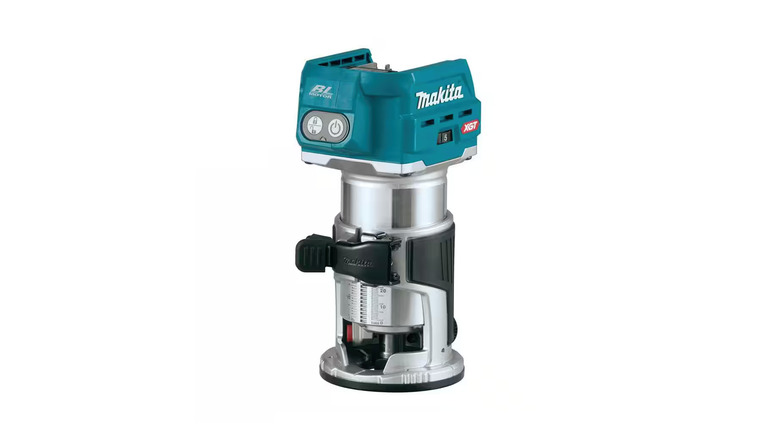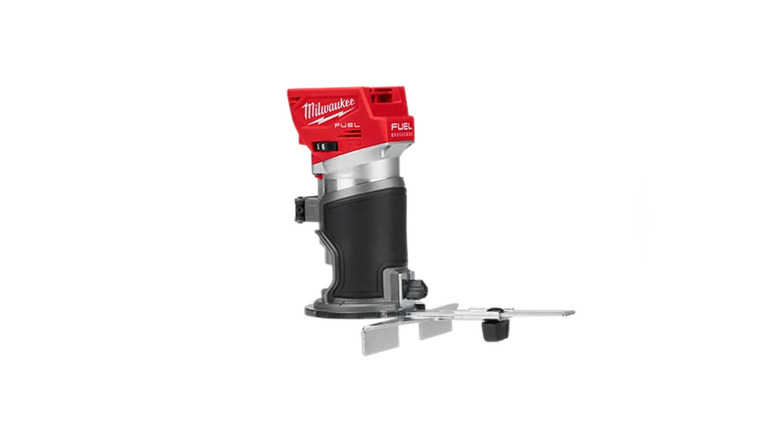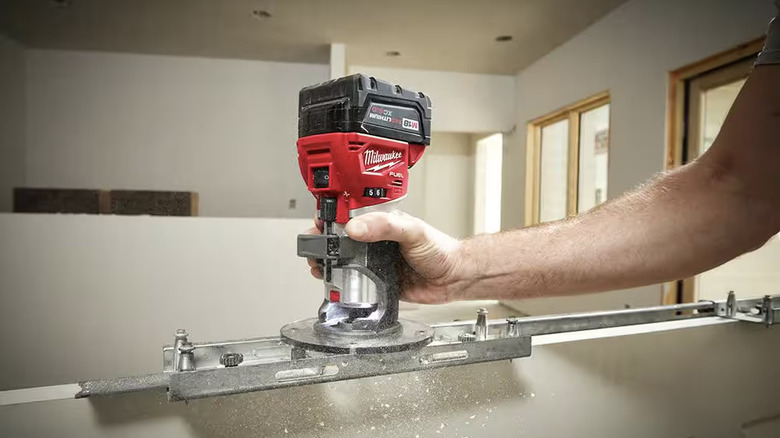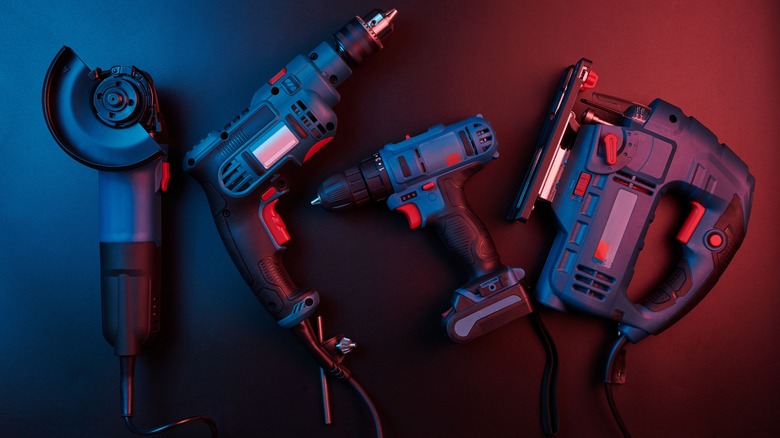Makita Vs. Milwaukee: Who Sells The Better Compact Router?
A compact router, also called a trim router, is a type of wood router that's a must-have in your tool collection if you enjoy woodworking projects. These tools, thanks to their size, are comfortable to hold and can help you make precise cuts on wood. If you're looking to add one to your arsenal, both Makita and Milwaukee offer solid options at comparable prices. If you don't have a clear preference for one of these brands over the other, it's a good idea to compare the key specifications of both products so you're able to determine which is better suited to your needs.
To help you make an informed decision, we've taken a deep dive into various aspects of Makita's 40V Max XGT Brushless Cordless Compact Router (GTR01Z) and Milwaukee's M18 FUEL Compact Router (2723-20), including their design, features, and the price points at which they're offered. We've also compared their user ratings and gathered insights from buyer and professional reviews. Read on to learn how these two impressive compact routers compare, and if one of them makes a better buy.
What about power and performance?
Makita's 40V compact router is designed with a brushless motor that can deliver a total power output of 1.5 HP, which is adequate for light- and medium-duty cutting tasks. If you're building heavy furniture, you might be better served by a full-sized router that can deliver an output above 2 HP. One of the highlights of this tool is that it has a brushless motor that not only offers better performance but also requires less maintenance in the long run, given that you won't have to replace any brushes. The router has a variable speed control dial, allowing you to adjust the speed from 10,000 to 31,000 RPM, while the rack-and-pinion mechanism lets you tweak the cutting depth precisely. The product has a pretty nifty soft-start feature, which prevents jerky starts and improves your accuracy.
On the other hand, Milwaukee's compact router is powered by an 18V battery that delivers an output of 1.25 horsepower. Again, this type of router is best suited for cutting and trimming projects that require precision but not a lot of power. Additionally, Milwaukee's compact router has a brushless motor, and it reaches speeds of up to 31,000 RPM like the Makita router. It can cut up to 250 feet per charger, which is great if you want to avoid frequent charging breaks during your work hours. The router also features a micro-adjust dial and a macro-adjust button that help control depth for better accuracy.
How the elements are designed
First, it's important to note that both of these routers have a cordless design. While corded tools almost always offer more juice than their cordless counterparts, cordless tools have a distinct advantage — flexibility and convenience. Whether you need to move around your workspace freely or are working outdoors without easy access to a power outlet, a cordless router can be a game-changer.
Coming to this router from Makita, the power tool features a pretty durable construction that makes it resistant to water, at least to some degree. This is great if you're working in outdoor conditions where you might not be able to control the environment. The router also has an on/off button with a lock feature to keep it from accidentally turning on while you're transporting it or holding it. The slim body and rubberized grip make it easy for the user to hold on to this tool and operate it for extended durations, and the LED lights are a helpful feature since they can illuminate darker work areas. The tool also has an aluminum base that can be swapped out for a different base. Weighing 5.54 lb., Makita's router is definitely not as heavy as a full-sized router.
Milwaukee's compact router, in comparison, also has a solid construction with a large 4" base that adds to its stability. You can, however, swap out the base for a different one based on the task at hand. One of the highlights of this tool is that it weighs just 2.95 lb. — almost half as much as Makita's offering.
What do they cost?
In terms of cost, both Makita and Milwaukee's compact routers come in at similar price points. Makita's 40V Brushless Cordless Compact Router, including two spanner wrenches, a 1/4" collet, two guides, and a trimmer base, costs $229 on The Home Depot's website. Keep in mind that you'll have to purchase the charger and battery separately or purchase the entire kit, which costs $519 on the same platform. Milwaukee's M18 FUEL Compact Router, which costs $199 on The Home Depot's website, is also available in a tool-only configuration; it also includes a few extras like a 1/4" collet, a 5-3/4" template sub-base plate, two wrenches, a dust shroud, and a guide.
Now that you know how these products compare in terms of features and specs, let's take a look at what users have to say about these tools. Makita's compact router has received far fewer ratings than Milwaukee's offering. On The Home Depot's website, Makita's router is rated 4.3 out of 5, with 100% of buyers recommending the product. However, the user score is based on just four ratings. There are also no professional reviews of this product available just yet. Milwaukee's compact router, on the other hand, is far more popular with buyers, as evidenced by its user score of 4.8 out of 5, which is the average of 4,600+ ratings. Additionally, 94% of buyers have recommended this product. Furthermore, Pro Tool Reviews rated it 9.7 out of 10 and noted that it didn't have any significant drawbacks, which is high praise coming from a professional publication.
Is there a winner?
Both Makita Tools and Milwaukee have a solid reputation that goes back several decades. That said, when it comes to determining which of these two products is likely to perform better, you'll need to consider your needs. Practically speaking, a 40V battery offers more power than an 18V battery, so Makita's router has the edge there. That said, if you're looking to use a compact router for several hours a day, comfort is a top priority. Milwaukee's tool is far lighter than Makita's, making it a better option for extended usage.
Another thing to note is the difference in the two brands' warranty periods. Makita's compact router comes with a three-year limited warranty, while Milwaukee's router includes a five-year warranty. Although the warranty only covers manufacturer defects, Milwaukee's extended warranty does offer more peace of mind, especially given that you're dropping a few hundred dollars on the tool. In terms of user ratings, Milwaukee's router is the clear winner. With thousands of buyers rating this tool so favorably, you're unlikely to be disappointed with it.
Methodology
It's never easy to make a decision when you have two comparably priced products with similar features. That said, analyzing the features, warranty limits, and user ratings for both of these tools helped us determine which areas each product excels in. You can use these insights to decide which of these two tools is a good fit for your needs.





